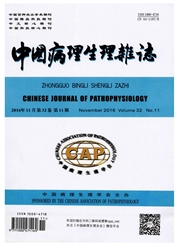

 中文摘要:
中文摘要:
目的:探讨前庭功能锻炼对运动病大鼠接受旋转刺激后血浆应激相关内分泌指标的变化,进一步阐明激素与运动病的内在联系。方法:旋转刺激72只雌性sD大鼠,根据大鼠条件性味觉厌恶程度判断其运动病敏感性。用放射免疫分析法测定血浆皮质酮、促肾上腺皮质激素(ACTH)、促肾上腺皮质素释放激素(CRH)和精氨酸加压素(AVP)水平,观察旋转刺激对血浆激素水平的影响。接着,进行前庭功能锻炼1个月,等大鼠对运动病产生耐受后,再观察旋转刺激对血浆激素水平的影响。结果:(1)大鼠经过1个月的前庭功能锻炼后,糖精水厌饮行为完全被抑制,说明达到了习服的效果;(2)旋转刺激可引起大鼠血浆皮质酮、ACTH和AVP水平升高(P〈0.05或P〈0.01),但经前庭功能锻炼后,旋转刺激对皮质酮的升高作用明显减弱;(3)不敏感组大鼠血浆皮质酮、ACTH、CRH和AVP的水平均高于敏感组,尤其是旋转刺激后的皮质酮、ACTH水平与CRH的基础水平(P〈0。05或P〈0.01)。并且,经过前庭功能锻炼,皮质酮、ACTH与CRH的基础水平在2组均高于前庭功能锻炼前(P〈0.05或P〈0.01),AVP基础水平也有一定程度的升高。结论:(1)给大鼠进行前庭功能锻炼可以达到习服的目的,抑制运动病的发生;(2)大鼠运动病敏感性的个体差异可能与血浆应激相关激素基础水平的高低相关。
 英文摘要:
英文摘要:
AIM : To investigate the relationship between motion sickness and the plasma levels of stress-relat- ed hormones in the rats before and after vestibular training. METHODS: Conditioned taste aversion (CTA) was induced in 72 female SD rats after rotatory stimulation. The magnitude of CTA was measured to reflect the susceptibility of rats to motion sickness. The plasma levels of corticosterone, adrenocorticotrophic hormone ( ACTH), corticotropin-releasing hot- mone (CRH) and arginine vasopressin (AVP) were analyzed by radioimmunoassay. Hormone levels were determined be- fore and after rotatory stimulation, and after 1 month of vestibular training when the rats obtained habituation to this rota- tion. RESULTS: CTA to 0.15% saccharin solution in rats after the rotatory stimulation was completely inhibited after ves- tibular training, suggesting that a habituation of the rats to motion sickness was obtained. The rotatory stimulation induced an elevation in the plasma levels of eorticosterone, ACTH and AVP, and this response of corticosterone to rotation was greatly reduced after vestibular training. The plasma levels of all 4 hormones in the rats insusceptible to motion sickness were higher than those in susceptible group, especially the plasma levels of corticosterone and ACTH after rotation, and the basal level of CRH. In addition, after vestibular training, the basal plasma levels of corticosterone, ACTH and CRH in both groups were higher than those before training, and a slight elevation was also observed in the basal level of AVP. CONCLUSION: Vestibular training may induce a habituation to rotatory stimulation in rats, thus inhibiting the develop- ment of motion sickness. The difference of the suseeotibility of rats to motion sickness may negatively relate to the basal plasma levels of stress-related hormones.
 同期刊论文项目
同期刊论文项目
 同项目期刊论文
同项目期刊论文
 期刊信息
期刊信息
